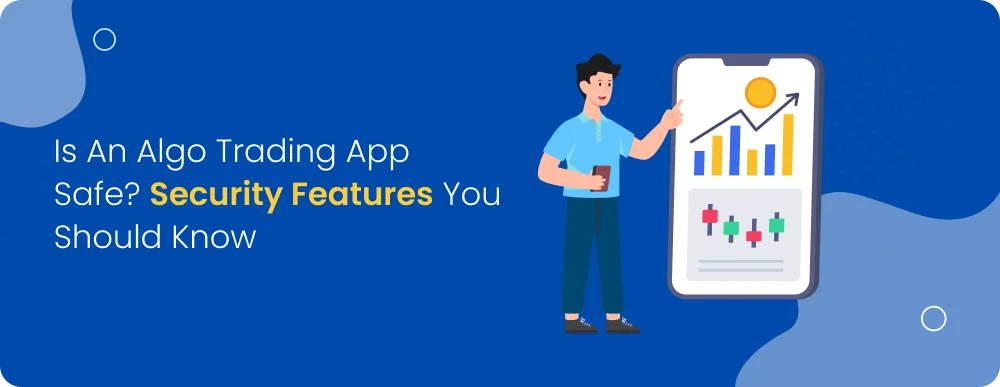Is An Algo Trading App Safe? Security Features You Should Know.
Noor Kaur
11 Jun 2025Tags:
Featured
Key Takeaways:
Not all algo trading apps follow the same security practices. While some use broker-approved APIs and basic risk controls, others might lack proper encryption or fail to log key trading actions. That puts both your money and trading strategy at risk.
In this blog, we’ll cover the safety features you should look for in an algo trading app, highlight the most common risks, and show you how to assess whether an app is built to protect your capital. Read along!
What Is an Algo Trading App?
An algo trading app helps you automate your trades using pre-set rules and logic based on price, volume, or other market conditions. Instead of placing trades manually, the app uses algorithms (computer-coded instructions) to execute trades at the right time and speed.
These apps widely apply trading strategies such as momentum trading, arbitrage, or mean reversion. They can run on cloud servers or your phone, and many connect directly with brokers or exchanges.
Also Explore Our Trading App
Is algo trading legal in India?
Algo trading is legal in India, but only through brokers approved by SEBI (Securities and Exchange Board of India). You must also follow the exchange’s rules and avoid using unregulated or unofficial platforms.
Common Security Risks in Algo Trading Apps
While algo trading can give you speed and discipline, it also comes with risks that aren't always obvious. Some key algorithmic trading risks from a security point of view include:
Unverified third-party code: Many users copy strategies from forums or use plug-ins without knowing their origin. Malicious code can steal data or place unauthorised trades.
Weak access controls: If your app doesn't have proper login protection, anyone who gets your credentials can misuse your account.
Fake or cloned apps: Some apps appear similar to trusted algo trading platforms but are designed to steal information or money.
API misuse: Many algo trading apps connect to your broker via APIs (Application Programming Interfaces). Your trading account could be exposed if these connections aren’t secured properly.
No visibility of logs: If the app doesn't clearly record every action, it’s hard to know if something went wrong or was tampered with.
Key Security Features to Look For
Before using any algo trading app, check if it meets basic security standards. You don’t need to know how the code works, but make sure the app offers these:
Secure login methods: Look for 2FA (two-factor authentication) and biometric options.
End-to-end encryption: Your data and trades should be encrypted during transmission, especially using public or shared networks.
Authorised broker integrations: The app should only connect with SEBI-regulated brokers using approved APIs. Avoid apps that ask for your broker credentials directly.
Audit trails and logs: You should be able to view every action the algorithm takes—what it bought, when, and why. This helps you track both performance and any irregular activity.
Manual override option: You can pause or stop the algorithm whenever needed. This is useful if the market behaves unexpectedly or has a technical issue.
Regular updates and support: A good algo trading app will release updates to fix bugs and patch security issues. If it hasn't been updated in months, that’s a red flag.
Importance of Regulatory Compliance:
Before using any algo trading platform, check whether it complies with local regulations. The Securities and Exchange Board of India (SEBI) regulates all automated trading activity in India.
Here’s why compliance matters:
Unregistered Apps May Disappear Overnight: Unauthorised apps can be banned without notice, leaving you without access to your trading account or strategy data.
Regulated Apps Follow Security Standards: Regulated brokers and platforms must meet security requirements, including regular audits and safe API (application programming interface) handling.
SEBI Restricts Certain Trading Strategies: SEBI guidelines also restrict automated trading strategies that may manipulate the market or cause unnecessary volatility. If you unknowingly use such strategies, your account could be flagged.
User-side Safety Practices:
Even if you're using a regulated app, your account’s safety depends greatly on how you handle it. A few simple actions on your part can reduce security risks:
Use a Dedicated Device for Trading: Avoid mixing trading activity with personal browsing or apps if possible.
Don’t Store Credentials in Browsers: Use a trusted password manager instead of letting browsers or apps remember sensitive data.
Avoid Public Wi-Fi Connections: Trading on unsecured networks can expose you to risks like session hijacking.
Manually Review Your Strategy: Re-check your algorithm regularly to ensure it suits current market trends.
Set Trade and Activity Alerts: Notifications for large orders or unusual trades help you spot issues quickly.
Keep Your App Up to Date: Many fixes for known security issues come silently through updates. Don’t skip them.
Most importantly, keep your app updated. Many security patches are released silently through updates, so ignoring them could expose you to known vulnerabilities.
Signs That an Algo Trading App May Be Unsafe:
Watch out for warning signs before trusting any algo trading app with real money:
Missing SEBI Compliance Info: Legitimate apps always mention regulatory approvals and broker ties.
Requests for Direct Broker Credentials: Never share your login outside the broker’s secure site.
No Support or Contact Details: Avoid apps with no official email, phone number, or office information.
Frequent App Crashes or Lag: Poor performance could mean security flaws or weak infrastructure.
Lack of User Reviews: If the app does not have real feedback or testimonials, it may not be trustworthy.
Unclear Trade Execution Process: You should always know how the app runs your strategies — avoid black-box systems.
Future of Algo Trading App Security:
As algo trading becomes more common, security around these platforms evolves quickly. Here’s what you can expect in the coming years:
Stricter Regulatory Oversight: Regulatory bodies like SEBI are expected to issue tighter controls on how algo trading platforms interact with broker systems, especially around direct API (Application Programming Interface) access. You’ll likely see mandatory licensing for developers of algorithmic trading tools.
In-built Risk Controls by Design: To reduce algorithmic trading risk, more platforms will offer pre-integrated guardrails such as real-time circuit breakers, auto order throttling, and exposure limits. These checks won’t be optional — they’ll be built into the system by default.
Shift Toward Broker-Integrated Apps: Instead of relying on third-party tools, brokers are expected to offer their algo trading modules within their platforms, removing the need for risky external apps. This setup will offer better visibility into your strategy execution.
Focus on Strategy Transparency: As algorithmic strategies become more complex, regulators and platforms will demand clearer documentation of how they work. Before going live, you may need to disclose key rules, parameters, and risk models.
Advanced Threat Detection Using AI: Some trading applications may use AI-driven monitoring to detect anomalies in strategy behaviour or login patterns. Think of it as fraud detection, focusing on algorithms, not just users.
More User Controls: You’ll likely get more control over how much automation your strategy can perform, including options to pause algorithms instantly or set stricter limits before the market opens.
Conclusion:
A reliable algo trading app should make your trades smarter and safer, not put you in a spot where you're unsure if the next trade will even go through securely. Focus on apps that don’t just talk about features, but explain their safety protocols, update cycles, and compliance practices.
The right choice will help you run your trading strategies with more confidence and less guesswork.
FAQs:
Can algo trading apps be hacked?
Like any online platform, algo trading apps can be vulnerable if not properly secured. Choose apps with strong encryption, multi-factor authentication, and regular security audits. Don’t store sensitive information on unsecured devices.
How is my data protected in trading apps?
Reputable algo trading apps follow strict data protection protocols, including encryption and secure storage. Check the app’s privacy policy and terms before sharing personal or financial information.
What permissions should an algo trading app have on my phone?
A trading app should only request access necessary for its function, like internet access and basic notifications. Avoid apps that require unrelated permissions such as contacts, camera, or location unless justified.
What are the common red flags of a scam trading app?
Be cautious of apps that:
Promise guaranteed returns
Don’t explain how their trading strategies work
Lack of verified user reviews
Are not listed on official app stores
These are often linked to algorithmic trading risk and can lead to major financial losses.
How can I verify if an algo app is registered with the authorities?
If you're trading in India, check if the app or platform is registered with SEBI (Securities and Exchange Board of India). You can visit SEBI’s official website or consult your broker to confirm registration. If you're wondering if algo trading is legal in India, the answer is yes, when done through SEBI-approved brokers.
What should I do if I suspect my trading app has been compromised?
Immediately log out of all devices, change your passwords, and contact the app’s support team. If you notice suspicious trades or withdrawals, inform your broker and report the issue to the relevant regulatory body.
Noor Kaur
11 Jun 2025Related blogs
Sign up to our newsletter !
Share this article on
Recent articles
Tags:
Open a Demat Account in just 15 minutes !

Click on open
account below

Fill out some
basic details

Upload your
documents

Start trading in
24 Hours *
Commonly asked questions
Is Master Capital Services Limited SEBI registered?
Do you have a mobile app for Trading and Finance Management?
What services does mastertrust provide?
What is the minimum investment required to start trading with your company?
Is my personal and financial information secure with your company?
What is your customer support availability?





